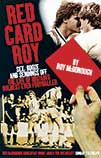 Sex, booze and sendings off: The life of Britain’s wildest footballer
Sex, booze and sendings off: The life of Britain’s wildest footballer
by Roy McDonough with Bernie Friend
Vision Sports, £12.99
Reviewed by Tom Lines
From WSC 309 November 2012
The football hard man is still a familiar figure, even if he is receding increasingly quickly into the game’s recent past. Popular culture tends to remember those who played at the highest level, where violent tackles and unsavoury moustaches were brought to a national television audience. For every Graeme Souness or Tommy Smith there were less well-known contemporaries in the the lower leagues. One such player was Roy McDonough, who accumulated a British record 22 early baths.
Apparently assembled from a bin of spare “Soccer’s Hard Men” tropes (the mullet and tache, the drinking and womanising, the failed marriage, the distant father he’s desperate to impress) McDonough is such an unrelenting stereotype that the obligatory career photos have presumably been included to reassure readers that they are not the victims of an elaborate spoof. Driven by limitless quantities of self-belief and an almost psychotic relish for physical confrontation, McDonough played just two first-team games during unhappy spells as a centre-forward at Aston Villa, Birmingham City and Chelsea. At the age of 22 he claims to have made a conscious decision to cruise through lower-league football as a way of funding his fondness for nightclubs.
A man who once promised a horrified physio that he would cut down to “just” 70 pints a week should be heading for a spectacular fall but it is the tragic suicide of Colchester team-mate John Lyons that, briefly, throws the boozing and one-night stands into stark relief. Alcohol permeates almost every page of this book but alcoholism is mentioned only once – when McDonough categorically rejects it as a description of his own drinking.
He is more honest in recounting the football side of his career, with team-mates, opponents, referees, supporters, managers and boardroom “suits” all subjected to withering assessments. There’s also a refreshing lack of dressing room omerta. It’s doubtful that Mark Kinsella will thank him for revealing a teenage fling with his landlady, though McDonough stops short of naming the team-mate who goaded Ian Holloway on the pitch by insulting his cancer-stricken wife.
He’s generous to those he respects too, without ever allowing it to affect his behaviour during a game. He idolises Southend boss Bobby Moore and when the manager gets wind of an unsettled score with Newport County’s Tony Pulis he pleads with McDonough not to let the team down. He is duly sent off after just seven minutes following a self-confessed attempt to decapitate the future Stoke manager.
Ghostwriter Bernie Friend has a great eye for period detail (there has surely never been a more evocatively named central-defensive partnership than Peterborough’s Neil Firm and Trevor Slack) and there are hilarious insights into some of the more eccentric characters of the era: Exeter boss Jim Iley’s fondness for games of hide and seek during training, for instance. In describing McDonough’s nocturnal activities the book occasionally slips into the kind of graphic detail that wouldn’t be out of place on the top shelf of a backstreet 1980s newsagent but this is still a fascinating voyage through a career described as “a violent trawl through the rough seas of the lower divisions”.